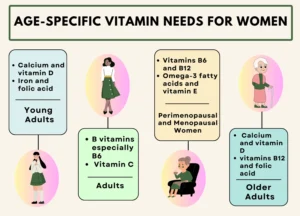Vitamins for Weight Loss for Females

Vitamins are vital for effective weight management and crucial to your weight loss journey. Specific vitamins are particularly beneficial for females due to hormonal changes, bone health needs, and other gender-specific factors.
This article explores the best “vitamins for weight loss for females”, considering different age groups and the benefits of obtaining vitamins from natural sources versus supplements.
Best Vitamins for Weight Loss for Females
Vitamin D
Vitamin D is widely recognized for its crucial role in maintaining bone health by aiding calcium absorption. However, its importance extends beyond just bones—it plays a significant part in weight management.
- Vitamin D helps regulate the storage of fat in the body. Low vitamin D levels have been associated with increased fat accumulation, particularly in the abdominal area. Adequate vitamin D levels support your body’s ability to manage and reduce fat stores.
- This vitamin can influence hormones that control hunger, such as leptin, which signals to your brain when you’re full. Adequate vitamin D can help maintain proper hormone function, potentially reducing overeating and helping with weight management.
- Vitamin D improves mood, which is crucial for maintaining a healthy lifestyle. A positive mood can enhance motivation to stick to a healthy diet and regular exercise for weight loss.
- A study in The American Journal of Clinical Nutrition found that women who took vitamin D3 supplements experienced greater weight loss than those who did not.
Sources of Vitamin D
Natural sources include sunlight, fatty fish (like salmon and mackerel), fortified dairy products, and egg yolks. Vitamin D supplements may be necessary for those with limited sunlight exposure.
B Vitamins (B6, B12, Folate)
A study shows that B vitamins are a group of water-soluble vitamins that play vital roles in energy production and metabolism. Each B vitamin has unique benefits that contribute to weight loss:
Vitamin B6 (Pyridoxine)
- Vitamin B6 is important for women as it helps regulate hormones. Hormonal imbalances can affect weight, so maintaining adequate B6 levels can support weight management efforts.
- It aids in the metabolism of protein, essential for muscle repair and growth, indirectly supporting weight loss by promoting a lean body composition.
Vitamin B12 (Cobalamin)
- Vitamin B12 forms red blood cells, which transport oxygen throughout the body. This oxygen is essential for converting food into energy, helping you feel more energetic and capable of maintaining an active lifestyle.
- B12 ensures that your body uses food efficiently, which helps maintain a healthy metabolism and supports weight loss.
Folate (Vitamin B9)
- Folate is essential for DNA synthesis and cell division, supporting overall metabolic health.
- It also helps reduce levels of homocysteine, an amino acid that can increase the risk of cardiovascular diseases, indirectly supporting weight loss by promoting overall health.
Sources of B Vitamins:
Rich sources include lean meats, fish, eggs, dairy products, leafy green vegetables, legumes, nuts, and seeds.
Vitamin C
Vitamin C, also known as ascorbic acid, is a powerful antioxidant that plays several roles in supporting weight loss:
- Vitamin C helps with the oxidation of fat, particularly during physical activity. This means it can enhance your body’s ability to burn fat as fuel during exercise, making your workouts more effective for weight loss.
- A strong immune system is essential for staying healthy and active. Vitamin C boosts your immune defenses, helping you avoid illness that can derail your fitness and weight loss efforts.
- Vitamin C contributes to the health of skin, blood vessels, and connective tissues, supporting overall well-being, which is important for maintaining an active lifestyle.
Sources of Vitamin C
Citrus fruits (oranges, lemons, grapefruits), strawberries, bell peppers, broccoli, and Brussels sprouts.
Vitamin A
Vitamin A is essential for several bodily functions that contribute to a healthy weight:
- It supports good vision which is crucial for overall well-being and physical activity engagement.
- Vitamin A enhances immune function, helping to keep you healthy and less susceptible to infections that could interrupt your weight loss efforts.
- It promotes healthy skin, boosts your confidence, and motivates you to stay active.
- Vitamin A plays a role in maintaining a healthy metabolism for weight management.
Sources of Vitamin A
Foods like sweet potatoes, carrots, dark leafy greens, liver, and dairy products.
Vitamin E
Vitamin E is another powerful antioxidant that supports weight loss through various mechanisms:
- Vitamin E helps combat oxidative stress which negatively impacts overall health and weight. By reducing oxidative stress, vitamin E supports cellular health and metabolism.
- It supports healthy skin and immune function contributing to good health and weight loss.
- Vitamin E’s anti-inflammatory effects can aid in recovery through exercise and reduce chronic inflammation, often associated with weight gain.
Sources of Vitamin E
Found in nuts and seeds (like almonds and sunflower seeds), spinach, broccoli, and vegetable oils.
Ensuring you get enough of these vitamins, through natural food sources or supplements, can help you achieve and maintain a healthy weight.
Age-Specific Vitamin Needs

The vitamin needs of women can vary significantly with age, and these needs can impact weight loss efforts. Here’s a breakdown of key vitamins for different age groups:
Young Adults (18-30)
- Women typically have a higher metabolic rate at this stage, which can support weight loss.
- However, bone development is still crucial, so vitamins like calcium and vitamin D are important.
- Iron and folic acid are also essential, especially for those who may become pregnant.
Adults (31-50)
- As women age, their metabolism can start to slow down.
- Managing these changes requires support from vitamins like B6 for hormonal balance and vitamin C for immune health.
- Stress management is also key, making B vitamins and vitamin C valuable.
Perimenopausal and Menopausal Women (51+)
- During this period, the risk of osteoporosis increases, making calcium and vitamin D critical.
- Managing menopausal symptoms can benefit from vitamins B6 and B12.
- Omega-3 fatty acids and vitamin E are also important for cardiovascular health.
Older Adults (60+)
- Nutrient absorption can decrease with age, so vitamins like B12 and D become even more important.
- Maintaining bone density with calcium and vitamin D is crucial, and vitamins B12 and folic acid support cognitive function.
Natural Sources vs. Supplements
When it comes to vitamins, it’s generally best to obtain them from natural food sources. However, there are certain circumstances where supplements may be necessary. Let’s delve into the benefits of getting vitamins from natural foods, the situations that may require supplements, and some practical tips for maximizing your vitamin intake from natural sources.
Benefits of Getting Vitamins from Natural Foods
- Whole foods provide a complex mix of vitamins, minerals, fiber, and antioxidants. This combination works together synergistically, meaning the nutrients enhance each other’s absorption and effectiveness. For example, vitamin C in fruits and vegetables can enhance iron absorption from plant-based foods.
- Whole foods pose a lower risk of vitamin overdose compared to supplements because it is difficult to consume excessively high amounts of vitamins from natural foods alone. In contrast, supplements can provide high doses that may lead to toxicity if not monitored carefully.
- Whole foods come with additional health benefits that supplements don’t offer. Foods rich in vitamins also contain fiber, supporting digestive health, and other bioactive compounds contributing to overall wellness. For instance, fruits and vegetables provide antioxidants that help combat oxidative stress and reduce inflammation.
- The body tends to absorb nutrients from whole foods more efficiently than supplements. This is due to the presence of other food components that aid in the digestion and absorption process. For example, the fat in avocados can help absorb fat-soluble vitamins like A, D, E, and K.
When Supplements May Be Necessary
While getting vitamins from natural foods is ideal, there are scenarios where supplements become necessary:
- People with dietary restrictions, such as vegans or vegetarians, might struggle to get enough vitamin B12, which is primarily found in animal products. In such cases, a B12 supplement can help prevent deficiencies.
- Certain health conditions can impair the body’s ability to absorb nutrients. For example, individuals with celiac disease or Crohn’s disease may have trouble absorbing vitamins from food and might need supplements to meet their nutritional needs.
- During certain life stages or conditions, the body’s nutrient needs increase. Pregnant women, for instance, require more folate and iron, which can sometimes be challenging to obtain solely through diet.
- If blood tests reveal a deficiency, such as low vitamin D levels, supplements can help restore optimal levels. This is especially important for vitamins that are hard to get in adequate amounts from food alone, like vitamin D from sun exposure.
- Individuals living in northern latitudes or those who spend little time outdoors may have limited sun exposure, which is essential for the body to produce vitamin D. In such cases, vitamin D supplements can be crucial to maintaining adequate levels.
Practical Tips for Natural Sources

Maximizing your vitamin intake from natural sources involves incorporating nutrient-rich foods into your diet. Here are some practical tips:
- Aim for a balanced diet including a wide range of fruits, vegetables, lean proteins, and whole grains. This ensures you get a broad spectrum of vitamins and minerals.
- Different colors in fruits and vegetables often indicate many types of nutrients. For instance, orange vegetables like carrots and sweet potatoes are rich in vitamin A, while green leafy vegetables are high in vitamins C and K. Eating a rainbow of foods helps ensure you get a variety of vitamins and antioxidants.
- Whole foods are minimally processed and retain most of their natural nutrients, unlike processed foods, which can be stripped of their vitamins and minerals. For example, whole grains retain more nutrients compared to refined grains.
- Fortified foods can help meet your vitamin needs, especially if you have dietary restrictions. Examples include fortified cereals, plant-based milk (with calcium and vitamin D), and orange juice fortified with vitamin D.
You can naturally obtain most of the required vitamins by focusing on a varied and balanced diet. However, remember that supplements may be necessary in some situations to ensure specific nutritional requirements.
Potential Side Effects of Supplements
- Some supplements can cause nausea, stomach cramps, and diarrhea. High doses of certain vitamins, like vitamin C and iron, are particularly prone to causing these issues.
Fat-soluble vitamins (A, D, E, and K) can accumulate in the body, leading to toxicity. Overconsumption can cause serious health issues, such as liver damage and bone abnormalities. - Some individuals may experience allergic reactions to supplements. Symptoms can include rash, itching, swelling, and breathing difficulties.
Supplements can interact with prescription and over-the-counter medications. These interactions can alter the effectiveness of medicines or cause adverse effects. Example: Vitamin K can interfere with blood thinners like warfarin. - Taking high doses of one vitamin can lead to imbalances and deficiencies in other nutrients. Example: Excessive zinc can interfere with copper absorption.
Pregnant women, children, and the elderly should be particularly cautious with supplements. These groups have different nutritional needs and higher sensitivity to overdoses. - Not all supplements are regulated equally; some may contain contaminants or not the advertised amount of nutrients. It is essential to choose high-quality supplements from reputable brands.
The long-term effects of taking high doses of supplements are not always well-studied. Unknown risks are likely with prolonged use.
Integrating Vitamins into a Healthy Lifestyle
When losing weight, many factors matter including diet, exercise, and overall lifestyle.
Diet and Nutrition
- Add a variety of fruits and vegetables to your meals to ensure a broad intake of vitamins.
- Include lean proteins, whole grains, and healthy fats for balanced nutrients.
- Focus on whole, unprocessed foods to maximize nutrient intake.
- Whole foods provide essential fiber and antioxidants along with vitamins.
- Plan meals around a colorful array of vegetables.
- Choose whole grains, like brown rice, quinoa, and oats instead of refined grains.
- Incorporate nuts, seeds, and legumes for added vitamins and minerals.
Also, read How to Use Barley for Weight Loss.
Exercise
- Regular physical activity enhances the effectiveness of vitamin intake by boosting metabolism and improving overall health.
- Exercise helps your body utilize the vitamins for energy production and muscle repair.
- Aim for aerobic exercises (like walking, running, cycling) and strength training.
- Include flexibility exercises like yoga to improve overall fitness and stress reduction.
Hydration
- Adequate hydration is essential for vitamin absorption especially water-soluble ones like B and C.
- Water helps transport nutrients throughout the body and supports metabolic processes.
- Drink plenty of water throughout the day, aiming for at least 8 glasses.
- Include water-rich foods like cucumbers, oranges, and melons in your diet.
Stress Management
- Chronic stress can negatively impact nutrient absorption and overall health.
- Stress management practices can enhance your body’s ability to use vitamins effectively.
- Incorporate activities, like yoga, meditation, and deep-breathing exercises into your daily routine.
- Ensure adequate sleep and practice mindfulness to manage stress levels.
Conclusion
It’s important to remember that vitamins are just one part of a comprehensive approach to weight loss, which should also include a balanced diet, regular exercise, proper hydration, and effective stress management. By including these elements in your lifestyle, you can lose weight sustainably and enhance your general health. Always consult a healthcare professional before making significant changes to your diet or starting new supplements to ensure they are appropriate for your needs.
FAQs
Can vitamins alone help me lose weight?
No, vitamins alone cannot cause weight loss. They support overall health and metabolism, but effective weight loss requires a combination of a balanced diet, regular exercise, and healthy lifestyle practices.
Is it better to get vitamins from food or supplements?
It’s generally better to get vitamins from natural foods because they provide a complex mix of nutrients that work synergistically. However, supplements can be necessary in certain situations, such as dietary restrictions, health conditions, or deficiencies.
Which vitamins are important for weight loss?
Key vitamins for weight loss include Vitamin D, B Vitamins (B6, B12, Folate), Vitamin C, Vitamin A, and Vitamin E. These vitamins support metabolism, energy production, and overall health.
Are there any side effects of taking vitamin supplements?
Yes, potential side effects of supplements include digestive problems, toxicity from fat-soluble vitamins, allergic reactions, interactions with medications, nutrient imbalances, and quality issues. It’s important to use supplements carefully and consult with a healthcare provider.
How can I incorporate more vitamins into my diet naturally?
You can increase your vitamin intake by eating colorful fruits and vegetables, choosing whole grains over refined grains, incorporating lean proteins and healthy fats, and including fortified foods.
Do I need to take a multivitamin for weight loss?
Not necessarily. If you have a balanced and varied diet, you might get all the vitamins you need from food. However, if you have specific dietary restrictions or deficiencies, a multivitamin can help fill the gaps. Always consult with a healthcare provider before starting any new supplement.
Can taking too many vitamins be harmful?
Yes, especially with fat-soluble vitamins (A, D, E, K), which can accumulate in the body and lead to toxicity. Overdosing on vitamins can cause serious health issues, so it’s crucial to follow recommended dosages and consult with a healthcare provider.
How does hydration affect vitamin absorption?
Adequate hydration is essential for the proper absorption and utilization of vitamins, especially water-soluble ones like B vitamins and vitamin C. Water helps transport these nutrients throughout the body and supports metabolic processes.






